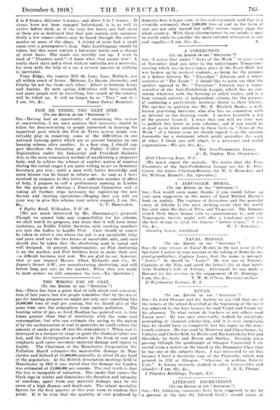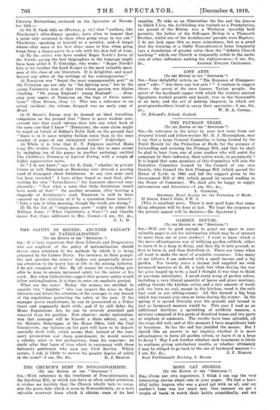LITERARY RECREATIONS. [To THE EDITOR OF THE " SPECTATOR.") SIR,—The
following comments have been suggested to me by a perusal of the late Sir Edward Cook's second series of Literary Recreations, reviewed in the Spectator of Novem- ber 15th:—
(1) Sir E. Cook tells us (Preface, p. vii.) that "authors, like Phackeray's after-dinner speaker, have often to lament that a point only occurred to them when going away in the cab." Thackeray, speaking of himself as a novelist, said—I forget where—that some of his best ideas came to him when going home from a dinner-party in a cab, with his skin full of wine.
(2) To the critics who have ranked Roger North's Lives of the Norths among the best biographies in the language might have been added S. T. Coleridge, who wrote: " Roger North's Life of his brother the Lord Keeper is the most valuable speci- men of this class of our literature. It is delightful, and much beyond any other of the writings of his contemporaries."
(3) Tennyson was "found the most companionable poet" in the Victorian age not only by the fighting men," but by the young University men of that time whose passion was Alpine climbing. "Oh young England! young England! . . . 'drop- ping your copies of Tennyson on the tops of Swiss moun- tains" (Tom Brown, chap. i.). This was a reference to an actual incident : the volume dropped was an early copy of Maud.
(4) If Bacon's Essays may be deemed an ideal travelling companion on the ground that "there is more wisdom com- pressed into that small volume than into any other book of the same size that I know" (Tennyson), the same claim might be urged on behalf of Selden's Table Talk on the ground that "there is in it more weighty bullion sense than in the same number of pages of any uninspired writer " (Coleridge).
(5) While it is true that F. T. Palgrave omitted Blake from The Golden Treasury, he atoned for this to some extent by including ten of his poems in another anthology entitled The Children's Treasury of Lyrical Poetry, with a couple of highly appreciative notes.
(6) " I do not know," says Sir E. Cook, " whether in private letters or talk Tennyson or Browning ever uttered a passing word of disrespect about Swinburne. At any rate none such has been recorded." I have either heard or read that, after reciting his own "Lotus-Eaters," the Laureate observed com- placently : "Now what a mess that little Swinburne would have made of that!" On another occasion, after hearing a rhapsody of Swinburne's read, Tennyson is said to have summed up his criticism of it by a quotation from himself : " Like a. tale of little meaning, though the words are strong."
(7) To the list of " single-poem poets" might be added Sir William Jones (" What Constitutes a State? ") and Charles James Fox (lines addressed to Mrs. Crewe).—I am, Sir, &c., C. L. D.















































 Previous page
Previous page